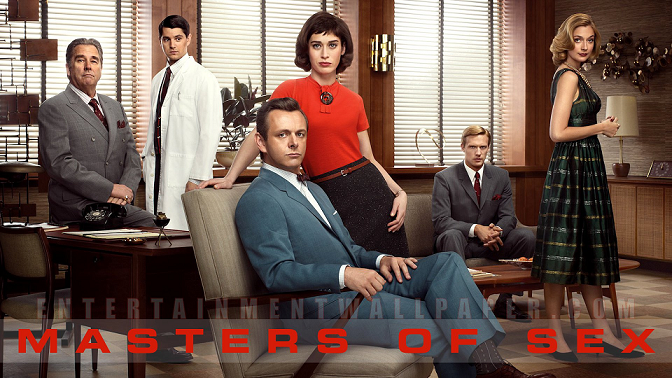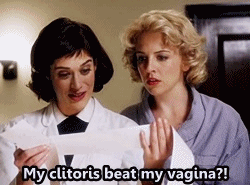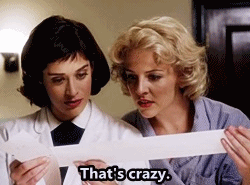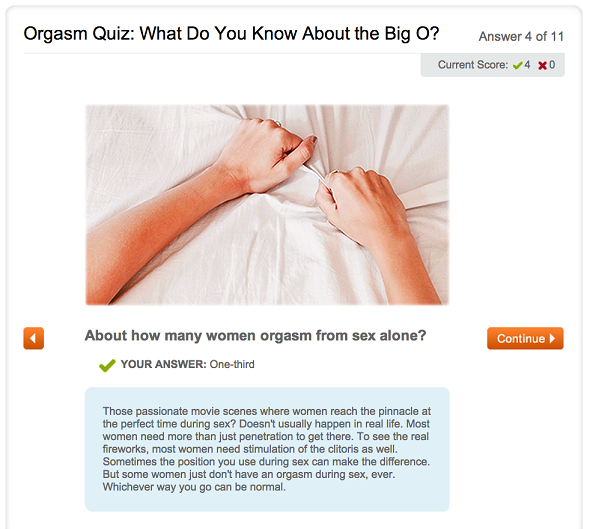Everything you wanted to know you know on Masters of Sex
Amy Adele Hasinoff / University of Colorado Denver

Showtime’s new series, Masters of Sex, offers a fictionalized account of the lives and work of sex researchers Bill Masters and Virginia Johnson. Beginning in the late 1950s, when psychoanalysis still dominated study of sex, Masters and Johnson revolutionized the field with their focus on quantifiable data derived from physiological observations.
Part of the appeal of programs like Masters of Sex is nostalgia. Nostalgia television, whether in the form of TV re-runs Lynn Spiegel has discussed or in this newly produced version of the 50s, offers a particular irony: viewers can celebrate the progress of the present by positioning it against an unjust past.1 We especially seem to enjoy imagining ourselves as sexually liberated and knowledgeable, a fantasy that likewise often needs to be contrasted with a supposedly sexually repressed past.2 What’s at stake in the way the show celebrates and promotes sexual knowledge and scientific inquiry about sex? What are the implications of locating this in the past?
Perhaps one of the key pleasures of the show is not the sex it depicts but the particular way it gives us permission to gain knowledge about sex. By depicting Bill and Virginia’s breathless late 1950s discoveries, we get the pleasure of reveling in our distance from this era of ignorance in the progressive present. But at the same time, the show seems to know that we actually still need painstakingly detailed lessons on human sexuality. For example, in episode 6, Bill and Virginia work on busting the Freudian myth that a vaginal orgasm is superior, distinct, and more mature than a clitoral orgasm. At mid-century, most gynecologists and psychoanalysts understood frigidity as the absence of a vaginal orgasm during coitus, and typically estimated that 75-90 percent of women suffered from this supposed dysfunction.3 The root of this apparently pathological problem was often thought to lie in the woman’s improper adherence to norms of gender and femininity.4
In the show and in their research, Masters and Johnson were skeptical of the common sense assumptions about frigidity and female sexual response. In one scene, Virginia measures her friend Jane’s physiological responses, such as heart rate and brain activity, for orgasms derived from vaginal and clitoral stimulation and finds them nearly identical, except that, contrary to popular knowledge at the time, the clitoral orgasm appeared to be stronger.


Later in the same episode, Bill instructs Virginia over the phone to pick up an anatomy textbook, which offers a simple explanation for why the two apparent types of orgasm may indeed be the same:
WILLIAM: Now, there’s a plate in the back, uh, a cross section of the female’s sex organs. See how the clitoral crura extend along the pubic arch almost to the bone? It’s at least conceivable that Freud’s mature orgasm
VIRGINIA: Is just another clitoral orgasm.
WILLIAM: Because the clitoris is stimulated in both cases.
VIRGINIA: So, uh, does this mean that
WILLIAM: Keep going.
VIRGINIA: Well, it means that a woman doesn’t need a man to provide pleasure at all. In fact, we may be better off without you.
WILLIAM: That was not exactly my point.
Virginia has trouble understanding why any woman would believe Freud’s theories about so-called immature orgasms, but Bill explains: “That’s why we keep the exam rooms stocked with Kleenex. A quarter of the women who walk through my door tell me they’re frigid.” Through these types of exchanges, the episode meticulously explains and dispatches with common misconceptions about female sexual response. Indeed, a 2009 io9 story, which incorrectly credits researchers who sonographically mapped internal clitoral structures with being the first to discover them at all, suggests that misconceptions may still be prevalent. It seems that despite Masters and Johnson’s groundbreaking research, debates and mythologies about clitoral, vaginal, or g-spot orgasms and whether they are physiologically distinct seem to persist. In a study of college students, roughly one-quarter could not correctly locate the clitoris on a diagram, and a similar proportion (25% of women and 33% of men) did not know that most women will not have an orgasm from coitus alone.5

This show taps into our desire not only to know about sex but also to know what we know about it. This might explain why sex quizzes are so ubiquitous. We want validation that we know what we know. Just like an online sex quiz, in weekly installments Masters of Sex teaches us something we (probably should but might actually not) already know.

The program constantly reminds us with a wink that all the sex and nudity it portrays is purely and unassailably for the pursuit of scientific knowledge. The science content of Masters of Sex is often trotted out in promotional materials and reviews to give viewers permission to watch people have sex on TV. USA Today’s review reassures viewers: “They watched people having sex for their research, and so do we. But Masters and Johnson’s interest was not prurient and neither is the series. It’s explicit, but never salacious.” TV Guide likewise promises that the show “somehow never makes you feel dirty for watching.” Like the subjects who participate in Masters and Johnson’s studies by having sex with strangers while electrodes taped to their bodies measure their physiological responses, we seem to like telling ourselves that we’re only watching the show “for science.”

The show’s webpage also includes a 10-question quiz that invites viewers to test their sexual knowledge.
Perhaps all this earnest insistence that the show is really about science rather than sex implies that things have not changed very much. The fact that we need this excuse to watch suggests that we are still caught in the same kind of self-defeating struggles with shame about sexual knowledge that Masters and Johnson worked against. Given the ubiquitous commercial representations of sex in TV, movies, and the booming pornography industry, why do we need the veneer of science to give us permission to watch this show? Perhaps it’s because watching Bill and Virginia discover things gives us permission to learn basic facts about sex that we are supposed to already know. Indeed maybe we want to know what we know about sex because we feel so insecure about this type of knowledge.
In that sense it’s appropriate that for every move towards sexual liberation and self-knowledge, Masters of Sex takes one step backwards as well. For example, in the narrative structure of the show, and particularly in episode 4, Virginia’s supposedly unique sexual self-knowledge matters primarily because it matters to the men in her life. William Masters, Virginia’s ex-husband George, and the younger doctor Ethan Haas are all enthralled with her sexual prowess, which comes from her self-knowledge, her detachment between sex and love, and her willingness to talk frankly about sex.
Yet we hear little about how any of these qualities might benefit Virginia and a lot about how important they are to these men who are obsessed with her. Bill listens to Virginia’s ex describe her in an interview:
GEORGE [recorded]: This one’s different. She—knows her self. She knows what feels good, she’ll tell you. And she wants you to tell her what you want her to do to you. What your fantasy is. Which is a fantasy itself. I’m telling you, doctor, this woman is magic.
It is perhaps fitting then, that as George talks about how magical Virginia is, we see her rushing home to try to get dinner on the table for her two kids, missing her bus, and then settling in on the bench to wait for the next one. Though as the season progresses Bill recognizes her first as a research assistant and then as a co-author, the type of magic and sexual knowledge Virginia possesses hasn’t yet solved the problems of being a working single mother. I suspect we enjoy identifying with Virginia and congratulating ourselves for knowing everything she knows about sex. But in the pleasure of comparing ourselves favorably to the past, does it matter that this might require that we forget, at least temporarily, about the problems of the present?

Image Credits:
1. Masters of Sex
2. Masters of Sex Tumblr
3. i09.com
4. Webmd.com
5. This Woman is Magic
Please feel free to comment.
- Spigel, L. (2001). Welcome to the dreamhouse: Popular media and postwar suburbs. Durham: Duke University Press. [↩]
- Foucault, M. (1990). The history of sexuality (R. Hurley, Trans.). New York: Vintage Books. [↩]
- Margolin, L. (2011). Sexual frigidity at mid-century: The social construction of a public health epidemic. POROI [↩]
- Angel (2010) argues: “The woman desiring clitoral stimulation, as opposed to vaginal intercourse, became representative of women who behaved like men and denied their maternal obligations – behavior that led to neurosis, isolation, and social disintegration” in The history of ‘female sexual dysfunction’ as a mental disorder in the 20th century. Current Opinion in Psychiatry, 23(6), p. 2. See also: Lunbeck, E. (1994). The psychiatric persuasion: Knowledge, gender and power in modern America. Princeton: Princeton University Press; Irvine, JM. (1990). Disorders of desire: Sexuality and gender in modern American sexology. Philadelphia: Temple University Press; and Maines, R. (1999). The technology of orgasm: ‘Hysteria’, the vibrator, and women’s sexual satisfaction. Baltimore: Johns Hopkins University Press. [↩]
- Wade, L. D., Kremer, E. C., & Brown, J. (2005). The incidental orgasm: The presence of clitoral knowledge and the absence of orgasm for women. Women & Health, 42(1), 117-138. If Bill’s observations about the proportion of ill-informed women are accurate to 1956, then the prevalence of people who seem to misunderstand female sexual response has not improved in half a century. However, I don’t know if the show found this number somewhere in Masters’ statements or if they invented the estimate. At any rate, Masters and Johnson were ahead of their time in their skepticism about the concept of frigidity. [↩]
Although I think Ms. Hasinoff makes an interesting analysis of Masters of Sex and is spot-on in supposing the show’s appeal is due to connections to nostalgia, I would have to disagree to a certain extent that the viewer’s relationship to this nostalgia is allowing them access to learn about sexuality and reinforce their own sexual knowledge. And that’s not to say that she’s wrong because certainly a good many people are watching the show and reaffirming their mastery of the human sexual response or learning about it.
(This is not surprising since the recent Bush administration promoted abstinence sexual education programs in schools). However I think that nostalgia is working in a different way, too and perhaps more prominently.
As Hasinoff says the insistence that the show is really about science rather than sex implies means that things are much of the same. She cites the show’s wink towards science research as a means to watch titillating scenes of intercourse. She also says that via nostalgia “viewers can celebrate the progress of the present by positioning it against an unjust past.”
But as Hasinoff says which I agree is that the present is really not at all that more progressive than the past? The way the show uses the nostalgic and historic setting of the 1950’s allows for the issues of women’s sexual health and institutional forms of misogyny to come to the surface, by tricking the viewer into believing this is the past, when in fact it is our present. I think the show toes this interesting line between progressive feminist discourse and perpetuating the tradition of exploiting women’s sexuality.
As Hasinoff notes the show promotes its sexuality as clinical and not erotic, however this is clearly not true and this line is conflated on the show itself, which can be seen when Bill Masters manipulates the project in order to sleep with Virginia, suggesting that they participate in the experiment as test subjects. And although Hasinoff is right in that an appeal to Masters of Sex is receiving validation that we know what we know it does not only pertain to the sexual knowledge that is proven on the show, but rather the ideological discourses about gender and sexual orientation too.
I love the analysis in this article, and I agree that the appeal of Masters of Sex is that it can capitalize on a lot of sex scenes, and yet is able to say it’s not gratuitous nudity – it’s a show about knowledge. Having your cake and eating it too.
I had a class about fantasy and sci-fi TV shows, including steam punk, and one of the things said was that medieval fantasy or Victorian steam punk were very popular because they offered a way of “having your cake and eating it too”, that is, you could have a story about mostly white people, in which the men did most of the cool things, and yet say your entire point is to criticize sexism and racism and how backward those views are. I see something similar in Masters of Sex and other period dramas, like Boardwalk Empire, Mad Men, even Game of Thrones.
The same type of phenomenon also happens in non-period shows like Ugly Betty (that criticizes the shallowness of the fashion industry while glamorizing it), and shows like Breaking Bad (that criticizes the drug industry and toxic masculinity while glamorizing it). It’s a very common artifice in television.
Pingback: New article on Masters of Sex up on FlowTV | Amy Adele Hasinoff